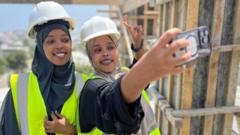In the bustling capital of Somalia, Mogadishu, a remarkable transformation is underway as the city emerges from a tumultuous past marked by civil war. Today, a construction boom is not only reshaping the skyline but also creating unprecedented opportunities for women in the field, particularly for young engineers Fathi Mohamed Abdi and Saadia Ahmed Omar.
At just 24 years old, Ms. Abdi, serving as the chief operating officer of Arkan Engineering Services, confidently oversees a 10-story residential project, navigating a male-dominated workforce with determination. "When I started, people doubted me," she recalls, referring to the skepticism she faced as a young female engineer. Her colleague, Ms. Omar, echoes the sentiment, stating, "Mogadishu needs us," as they both strive to rebuild their city, which still bears the scars of conflict.
With over 6,000 buildings constructed in the last five years, the demand for skilled professionals is changing the traditionally male-oriented landscape, paving the way for women like Abdi and Omar. The Somali Engineers Association is also promoting this shift, advocating for female participation to fill gaps in the workforce. However, challenges remain, as women represent only 5% of engineers in the country, and opportunities for mentorship are limited.
Despite the hurdles, Abdi and Omar have successfully overseen more than 30 multimillion-dollar projects and are slowly changing perceptions about women's roles in engineering. Yet, the rapid pace of construction raises concerns about safety and quality, as older architectural traditions begin to disappear.
While some fear the loss of historical character, city officials recognize the need for modernization. The improvements in security and influx of diaspora investments have fueled growth, yet urban challenges, including inadequate sewage systems and environmental risks, linger.
Even with potential threats from groups like al-Shabaab, both Abdi and Omar remain optimistic, confident that their work contributes significantly to Mogadishu's evolving identity. "We are not just building structures; we are building hope," Ms. Abdi states proudly, as both engineers exemplify a new generation dedicated to reconstruction and development in Somalia.
At just 24 years old, Ms. Abdi, serving as the chief operating officer of Arkan Engineering Services, confidently oversees a 10-story residential project, navigating a male-dominated workforce with determination. "When I started, people doubted me," she recalls, referring to the skepticism she faced as a young female engineer. Her colleague, Ms. Omar, echoes the sentiment, stating, "Mogadishu needs us," as they both strive to rebuild their city, which still bears the scars of conflict.
With over 6,000 buildings constructed in the last five years, the demand for skilled professionals is changing the traditionally male-oriented landscape, paving the way for women like Abdi and Omar. The Somali Engineers Association is also promoting this shift, advocating for female participation to fill gaps in the workforce. However, challenges remain, as women represent only 5% of engineers in the country, and opportunities for mentorship are limited.
Despite the hurdles, Abdi and Omar have successfully overseen more than 30 multimillion-dollar projects and are slowly changing perceptions about women's roles in engineering. Yet, the rapid pace of construction raises concerns about safety and quality, as older architectural traditions begin to disappear.
While some fear the loss of historical character, city officials recognize the need for modernization. The improvements in security and influx of diaspora investments have fueled growth, yet urban challenges, including inadequate sewage systems and environmental risks, linger.
Even with potential threats from groups like al-Shabaab, both Abdi and Omar remain optimistic, confident that their work contributes significantly to Mogadishu's evolving identity. "We are not just building structures; we are building hope," Ms. Abdi states proudly, as both engineers exemplify a new generation dedicated to reconstruction and development in Somalia.




















